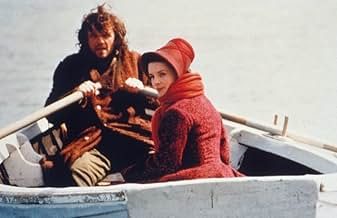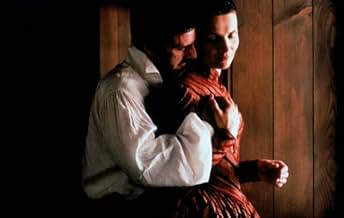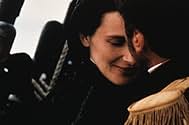La veuve de Saint-Pierre
- 2000
- Tous publics
- 1h 52m
IMDb RATING
7.1/10
5.8K
YOUR RATING
In a small French colony, a drunken man kills someone. While a guillotine is being shipped in, he changes, becoming a good and popular man.In a small French colony, a drunken man kills someone. While a guillotine is being shipped in, he changes, becoming a good and popular man.In a small French colony, a drunken man kills someone. While a guillotine is being shipped in, he changes, becoming a good and popular man.
- Director
- Writers
- Stars
- Awards
- 3 wins & 9 nominations total
- Director
- Writers
- All cast & crew
- Production, box office & more at IMDbPro
Featured reviews
8=G=
As the best of French cinema does so adroitly, "The Window of Saint-Pierre" tells most of it's story laconically with knowing looks and subtle behaviors while the story it tells is a relentlessly plodding drama of unspoken words and the emotions they evoke. "Widow..." is more about integrity, honor, love, and other intangibles than it is about its relatively simple storyline and the characters involved. A beautifully crafted somber film, "Widow..." is recommended for mature audiences because a measure of maturation is required to appreciate all this austere film has to offer.
You have to watch the odd foreign film such as this to understand just how far Hollywood has strayed from cinematic honesty. This is a simple, beautifully done, superbly acted piece of theatre set in one of the world's least known places, the fog shrouded French island of St. Pierre, off Newfoundland. It's a simple yet gripping film with an intriguing plot, almost a morality play. There is visceral human drama, much mystery and wonderful soul stirring pathos. And how nice to see a movie without the mandatory Hollywood happy ending. A well spent evening!
I was most impressed with the visual language of this movie that does not waste words to show emotions. The tensions are well reflected in the play of the actors, whose gestures, shrugs and smiles say more than a thousand lines.
Another interesting feature of the movie is that it does not follow the easy path of romance that is "expected" by the public. In turn, it exposes a world which is cruel, unfair, where justice is determined by personal interests and where those who fight the system are seen as mad and excluded from the "high society".
It is a movie about the determination to fight for something one believes in!
Another interesting feature of the movie is that it does not follow the easy path of romance that is "expected" by the public. In turn, it exposes a world which is cruel, unfair, where justice is determined by personal interests and where those who fight the system are seen as mad and excluded from the "high society".
It is a movie about the determination to fight for something one believes in!
The ancient Greeks, gifted with an abstract way of thinking that was always trying to come down to earth and clothe itself with the commonplace occurrences of everyday life, did not have one all-embracing term for love, a we do, but broke it down into four types: affection (storge), friendship (phileo), sex (eros) and charity (agapao). And probably not since the ancient Greeks has a love story come along which not only divides love into its four types, but also weaves them, with enormous skill, into a single story. The Widow of Saint-Pierre is a love story of the tragic Greek proportions. It's an enormously beautiful movie, a story that gains power with every viewing. And for that reason, it's one of the most remarkable videos I've seen in a very long time.
We've all seen a plethora of films from Hollywood, which basically confine love, and the act of love, to eros. We all know the well-worn script. But what would it look like to view a film in which a relationship expresses all four types of love, and throbbing full force? I would be giving too much away if I were to tell you how these four types of love are rolled up so tightly into a single relationship, but that's exactly what we seen in the liaison between Jean, the Captain (Auteuil) and his wife, Pauline (Binoche). It's intensely interesting, because the performances are pitch-perfect. Even the cowardly bureaucrats, who feel threatened by the captain and his wife, are a picture of cowardly perfection. Their motives are all too human, all too real. But so is the unfathomable love they don't understand, and fear.
One of the things I really appreciate about this film is the way it expresses all forms of love as having boundaries. Jean and Pauline are not clinging vines. What we see is a mature, healthy relationship, each partner respecting the unique characteristics of the other. What a contrast to the infantile clinging vine romances out of Hollywood!
We've all seen a plethora of films from Hollywood, which basically confine love, and the act of love, to eros. We all know the well-worn script. But what would it look like to view a film in which a relationship expresses all four types of love, and throbbing full force? I would be giving too much away if I were to tell you how these four types of love are rolled up so tightly into a single relationship, but that's exactly what we seen in the liaison between Jean, the Captain (Auteuil) and his wife, Pauline (Binoche). It's intensely interesting, because the performances are pitch-perfect. Even the cowardly bureaucrats, who feel threatened by the captain and his wife, are a picture of cowardly perfection. Their motives are all too human, all too real. But so is the unfathomable love they don't understand, and fear.
One of the things I really appreciate about this film is the way it expresses all forms of love as having boundaries. Jean and Pauline are not clinging vines. What we see is a mature, healthy relationship, each partner respecting the unique characteristics of the other. What a contrast to the infantile clinging vine romances out of Hollywood!
The actions of two men on a drunken spree turns out to be fatal for the man who is being harassed because he dies as a consequence of a fight with his two tormentors. Both men are apprehended and condemned to die as punishment for their actions. The way to die is beheading by guillotine, or "the widow" in the vernacular.
Thus begins this story that director Patrice Leconte directed, based on the screen play by Claude Faraldo. The story is set in the remote island of Saint Pierre, off the coast of Newfoundland. This is a hostile environment settled by the French. Saint Pierre boasts a lot of widows who have survived the rigors of the climate and the hard lives their husbands led.
Into this milieu we find a military captain and his wife. Both are Parisians and appear to be compassionate, at heart. When Neel, the surviving drunk is brought to be kept in a cell within the military quarters of the island, the wife, Madame La, takes an interest in the man. With her husband's consent, she asks for his help in tending a green house in the premises and other errands.
Neel and Madame La are at simple view, just opposites. The kindness Neel sees in her, transforms him. Madame La even goes to help him learn to read. All these actions don't sit well with the rest of the inhabitants and the people in the government who demand a guillotine is sent over and have him execute the prisoner.
The film works because the brilliant performance of Juliette Binoche, who as Madame La, makes her mark in the picture. Her compassion for Neel is genuine; in her heart she believes this man, a product of the environment in which he was born, shows qualities that no one has seen in him.
Emir Kusturica, a noted film director himself, is also one of the assets of the movie. Mr. Kusturica is a large man with unkempt looks, who is totally believable as Neel. His interaction with Madame La turns from gratitude into a noble love that is not meant to be.
The other principal is Daniel Auteuil who is perfect as the captain, the husband of Madame La, who is outraged by what he perceives to be the wrong punishment for the accused Neel. In spite of the menacing presence of Neel next to his wife, he trusts her as he knows her kind heart belongs to him only.
"La veuve de Saint Pierre" is a great movie that will satisfy viewers in search of a different story. Patrice Leconte has directed with panache as he takes us to see the beauty of Saint Pierre, something that is so bleak, yet it's a place that has a magnetic attraction as we watch the film unfold.
Thus begins this story that director Patrice Leconte directed, based on the screen play by Claude Faraldo. The story is set in the remote island of Saint Pierre, off the coast of Newfoundland. This is a hostile environment settled by the French. Saint Pierre boasts a lot of widows who have survived the rigors of the climate and the hard lives their husbands led.
Into this milieu we find a military captain and his wife. Both are Parisians and appear to be compassionate, at heart. When Neel, the surviving drunk is brought to be kept in a cell within the military quarters of the island, the wife, Madame La, takes an interest in the man. With her husband's consent, she asks for his help in tending a green house in the premises and other errands.
Neel and Madame La are at simple view, just opposites. The kindness Neel sees in her, transforms him. Madame La even goes to help him learn to read. All these actions don't sit well with the rest of the inhabitants and the people in the government who demand a guillotine is sent over and have him execute the prisoner.
The film works because the brilliant performance of Juliette Binoche, who as Madame La, makes her mark in the picture. Her compassion for Neel is genuine; in her heart she believes this man, a product of the environment in which he was born, shows qualities that no one has seen in him.
Emir Kusturica, a noted film director himself, is also one of the assets of the movie. Mr. Kusturica is a large man with unkempt looks, who is totally believable as Neel. His interaction with Madame La turns from gratitude into a noble love that is not meant to be.
The other principal is Daniel Auteuil who is perfect as the captain, the husband of Madame La, who is outraged by what he perceives to be the wrong punishment for the accused Neel. In spite of the menacing presence of Neel next to his wife, he trusts her as he knows her kind heart belongs to him only.
"La veuve de Saint Pierre" is a great movie that will satisfy viewers in search of a different story. Patrice Leconte has directed with panache as he takes us to see the beauty of Saint Pierre, something that is so bleak, yet it's a place that has a magnetic attraction as we watch the film unfold.
Did you know
- TriviaThe film was to be completely filmed on the island of Saint-Pierre, but when the snow failed to arrive, the production had to move further north to Newfoundland for certain sequences.
- GoofsWhen Neel is told he's strong enough to "ramer jusqu'au chez les Anglais", the English subtitles say "row over to Canada" rather than "row over to the English". This introduces an error: both the geography and the dialogue in other scenes make it clear that Newfoundland is meant, but Newfoundland wasn't part of Canada until 1949.
- ConnectionsFeatured in The 58th Annual Golden Globe Awards 2001 (2001)
- How long is Widow of St. Pierre?Powered by Alexa
Details
- Release date
- Countries of origin
- Official site
- Language
- Also known as
- Widow of St. Pierre
- Filming locations
- Fortress of Louisbourg, Louisbourg, Nova Scotia, Canada(as Saint-Pierre)
- Production companies
- See more company credits at IMDbPro
Box office
- Budget
- FRF 100,000,000 (estimated)
- Gross US & Canada
- $3,193,889
- Opening weekend US & Canada
- $31,702
- Mar 4, 2001
- Gross worldwide
- $7,193,889
- Runtime
- 1h 52m(112 min)
- Color
- Sound mix
- Aspect ratio
- 2.35 : 1
Contribute to this page
Suggest an edit or add missing content
































